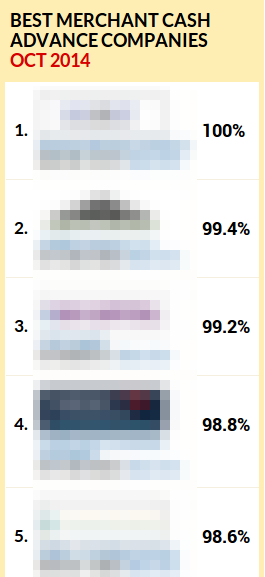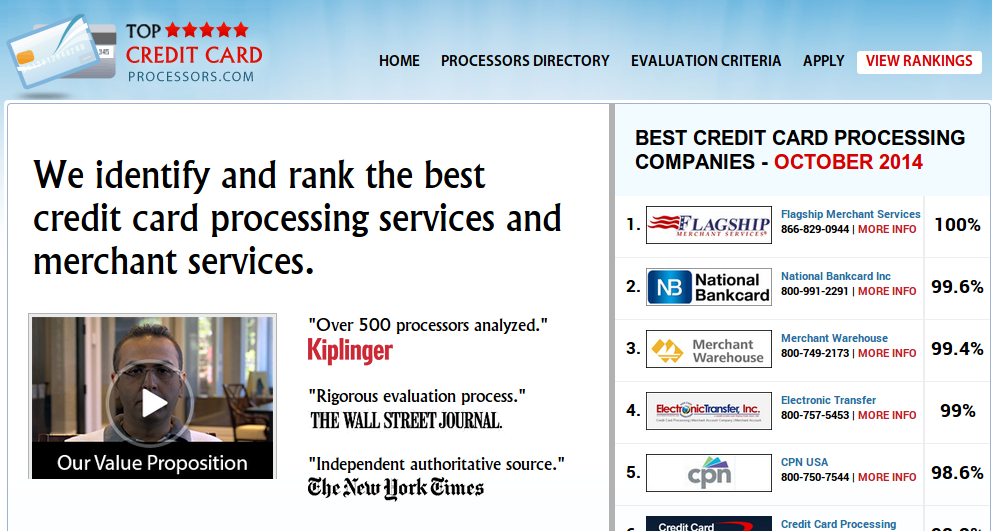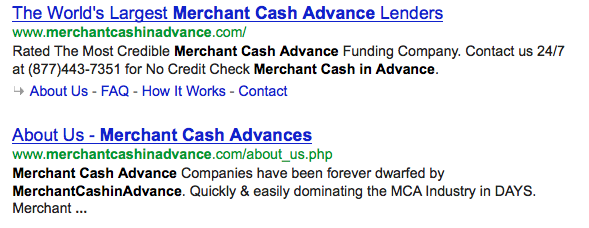Stories
Merchant Cash Advance SEO War Still Raging
October 9, 2014 The top ten merchant cash advance companies ranked on a review website must have earned their placements due to actual reviews, right? Not so, say rival online marketers who’ve claimed sites such as topcreditcardprocessors.com are really just part of an elaborate paid lead generation scam.
The top ten merchant cash advance companies ranked on a review website must have earned their placements due to actual reviews, right? Not so, say rival online marketers who’ve claimed sites such as topcreditcardprocessors.com are really just part of an elaborate paid lead generation scam.
Mark Jackson, a blogger and marketer, had alleged that a website known as TopSEOs.com had been using deceptive practices for years. Three weeks ago a former employee of TopSEOs.com emailed Jackson to offer damning information that his suspicions had been right. That included a list of 15 other websites related to TopSEOs.com that were running similar review schemes. All are apparently owned by an individual named Jeev Trika.
While I don’t know Trika or if the allegations are true, I do know from what Jackson wrote is that he forwarded the email chain and the website list to Google’s director of web spam, Matt Cutts. That included topcreditcardprocessors.com
In recent years, Google has taken aggressive action to de-rank and de-list sites engaged in bad behavior from their search index. One example of bad behavior is a site that provides a poor user experience. Deceiving users into believing that businesses had been reviewed and ranked accordingly is deceptive if the true model is just about who pays the most to get ranked the best.
In New York State, fake reviews can be a criminal offense. Just ask the 19 companies that were ensnared in a deceptive review sting last year, causing them to be hit with $350,000 in penalties.
In addition to credit card processors, topcreditcardprocessors.com also ranked merchant cash advance companies. What’s rough is that all of the websites Jackson submitted to Cutts have been de-listed from Google’s search index, indicating that Google likely concluded those domains violated their Terms of Service.
 Jackson pointed out that Trika, the mastermind behind it all, was already taking measures to get back up and running in Google’s search index by moving from TopSEOs.com to TopSEOsGlobal.com. Similarly, topcreditcardprocessors.com has already moved their content to topcreditcardprocessorsglobal.com. All their first page search rankings have been lost for now so that probably means fewer leads for many companies over the next few weeks.
Jackson pointed out that Trika, the mastermind behind it all, was already taking measures to get back up and running in Google’s search index by moving from TopSEOs.com to TopSEOsGlobal.com. Similarly, topcreditcardprocessors.com has already moved their content to topcreditcardprocessorsglobal.com. All their first page search rankings have been lost for now so that probably means fewer leads for many companies over the next few weeks.
Of course there are a few similar websites to topcreditcardprocessors.com that purport to review merchant cash advance companies. The risk if they’re shut down is not just a loss of leads but a potential loss of trust by search engines for anyone that paid to appear on them. Google treats sites participating in link manipulation schemes unfavorably and has expanded the scope of how these schemes are defined a lot in the last twelve months.
@financeguy74 I like the full-size Penguin in the doorway–I think we have one of those!
— Matt Cutts (@mattcutts) September 30, 2014
Unless you’ve been in a coma, Google’s Penguin algorithm specifically targets websites engaged in link schemes. It’s uncertain if paid links on review sites like these would be covered under Penguin, but Penguin’s 3rd major run is expected to roll out any day now.
Google’s director of web spam has a good sense of humor when it comes to Penguin jokes, but Cutts is known to be absolutely ruthless when he discovers actual terms of service violators in their index. Back in December, Cutts articulated that he wanted to break their spirits. As quoted on Search Engine Land, he said:
if you really want to stop spam, it is a little bit mean, but what you want to do, is sort of break their spirits. There are lots of Google algorithms specifically designed to frustrate spammers. Some of the things we do is give people a hint their site will drop and then a week or two later, their site actually does drop. So they get a little bit more frustrated.
Just emailing Cutts evidence of manipulation is enough to put offending sites out of business or at least out of reach from Google searchers. That is what Mark Jackson appears to have accomplished by forwarding an email chain referencing TopSEOs.com and other sites.
A screenshot of the home page of what is now topcreditcardprocessorsglobal.com below:

Review sites might be one way companies are generating leads online now, but check out some of my historical coverage regarding the war for Internet leads in this space:
Six Signs Alternative Lending is Rigged: Do Lending Club and OnDeck have a helping hand?
Google Penguin 2.1 takes swing at the MCA industry
Your merchant cash advance press release may be hurting you
Is Google your only web strategy?
The other 93% [of leads]
The SEO War for Merchant Cash Advance: The first story on this topic
Lawsuit Alleging Google Ad Abuse is Latest Iteration of the Search War
May 20, 2021 Google parent company Alphabet reported a record profit in Q1 2021 of $18 billion, up 162% from 2020. The firm attributes the success to a 32% surge in Covid related advertising sales.
Google parent company Alphabet reported a record profit in Q1 2021 of $18 billion, up 162% from 2020. The firm attributes the success to a 32% surge in Covid related advertising sales.
A recent lawsuit from ten US States filed in a district court in Texas would argue that it’s not just a covid based bump in ad sales. According to the WSJ, in response to the lawsuit, Google accidentally confirmed what prosecutors suspected: they run a secret program called “Project Bernanke” that uses proprietary data to win bids on the firm’s ad exchange, netting hundreds of millions of dollars over the years. It amounts to a digital ad monopoly, which has already pushed Google’s parent company, Alphabet, to new highs.
Google’s ad exchange works like a stock exchange for marketing, as enterprises buy and sell placements and seconds of attention within the Google advertising universe. Firms bid on purchasing slots for ads in browsers and videos, and the auctions happen lightning fast in real-time. The lawsuit from ten states through the Taxes district court alleges Google used insider information on what they knew firms were willing to pay, to drive the prices as high as they would go.
Google is both on the buy and sell-side of its transactions and admitted in the papers WSJ saw that the data they mined to inform bids in Project Bernanke was not disclosed to publishers. The papers were quickly redacted and sealed by a judge days after WSJ found the details. The documents also mention “Jedi Blue,” a sweetheart deal between Google and Facebook. Instead of competing with Google ads, Facebook agreed to bid on and automatically win a fixed percentage of Google ad auctions. The deal originated back in 2018 when Facebook announced it was joining a competitor advertising program called “open bidding.” The states’ lawsuit alleges the firms must have made a side deal then, and the leaders of the internet ad market colluded; it’s why a bipartisan coalition of ten states is pushing back.
deBanked has tracked Google’s relationship with funders who use the search engine for marketing their products. After reducing the effetiveness of SEO and forcing most businesses into buying ad space out of necessity, the new lawsuit alleges Google rigged the game for themselves. The House always wins.
Back in 2012, deBanked’s Sean Murray first evaluated the SEO landscape. Google punished blogs that were printing out backlinks by the hundreds, nose-diving the competitive market for SEO rankings.
In 2014, Google’s “penguin algorithm” inflicted further pain.
In 2017, Google outright blocked merchant cash advance as an advertising keyword.
“You Can’t Stay Static”: Paul Teitelman and the Building of an SEO Firm
June 30, 2019
 How does someone become an SEO expert? How does someone found a successful SEO consultancy firm? For Paul Teitelman, his road to SEO mastery and independence started by admitting he knew nothing about the industry.
How does someone become an SEO expert? How does someone found a successful SEO consultancy firm? For Paul Teitelman, his road to SEO mastery and independence started by admitting he knew nothing about the industry.
Beginning in the late noughties, following his graduation in Marketing Management from Dalhousie University, Teitelman went to an Interactive Advertising Bureau job fair, pitched himself to his soon-to-be boss, and replied, “No! But I’m your man. I’ll learn it all,” when asked if he knew anything about SEO.
Thus began his tenure at Search Engine People, one of Canada’s first Search Engine Marketing companies. Here he entered as a Link Ninja and learned the trade by implementing SEO campaigns for both Fortune 100 and 500 companies as well as for local businesses. From this, he advanced to a managerial position, in which he led teams of SEO specialists who were responsible for ensuring clients would appear at the top of Google search pages. And then, in 2011, Teitelman left Search Engine People to make his own way, becoming the CEO and founder of his self-titled, Toronto-based SEO consultancy firm.
How did the move to independence pan out? Well, as of June 2019 he has hired his 25th employee, his team is kept busy servicing the needs of clients, and he experiments with pioneering SEO strategies and theories within his own blog network. Claiming that his firm offers “the best of both worlds” as a result of him having worked on both ends of the SEO spectrum, Teitelman explains that clients benefit from his offering of the transparency, promptness, and directness that are inherent with small firms; and that he reaps the reward of an agency price tag, a perk that comes with producing consistently successful SEO work.
 When asked about how others could follow in his footsteps, he said, regardless of the industry, whether you’re an SEO expert or broker, that “you can’t stay static.” Emphasizing the necessity of having foresight when you leave your old job, Teitelman notes that entrepreneurs need to stay ahead of the curve of trends, be that an update to Google’s search result algorithm or a niche opening in the alternative finance market. As well as this, Teitelman highlighted the importance of being secure in that knowledge that when you leave to make it independently you will have a list of clients to take with you, who’ll keep you from leaving yourself high and dry.
When asked about how others could follow in his footsteps, he said, regardless of the industry, whether you’re an SEO expert or broker, that “you can’t stay static.” Emphasizing the necessity of having foresight when you leave your old job, Teitelman notes that entrepreneurs need to stay ahead of the curve of trends, be that an update to Google’s search result algorithm or a niche opening in the alternative finance market. As well as this, Teitelman highlighted the importance of being secure in that knowledge that when you leave to make it independently you will have a list of clients to take with you, who’ll keep you from leaving yourself high and dry.
And much like how the merchant cash advance scene in Canada has seen an increase in both interest and product knowledge amongst customers over recent years, as has SEO. Subject to myth-making and conjecture as a result of its technical lingo and specialized nature, SEO has long been the victim of misunderstanding according to Teitelman, who says those who are curious about the service “shouldn’t believe everything they read on the internet.”
Going on to say that “the more education customers get, the more exciting the industry becomes,” it’s clear that Teitelman is looking forward to the future of SEO. Time will tell if his offer back in 2008 will be matched by interested industries, curious about the possibilities that SEO promises and willing to “learn it all.”
Paul Teitelman is also speaking on a sales and marketing strategies panel at deBanked CONNECT Toronto on July 25th alongside Smarter Loans President Vlad Sherbatov and SharpShooter Funding Managing Partner Paul Pitcher.
Who Needs The Merchant Cash Advance Keyword Anyway?
May 31, 2022 Almost five years since Google banned its search engine from displaying ads when queries contain the phrase “cash advance,” the loss of business attributed to that has probably been nil to the small business finance space.
Almost five years since Google banned its search engine from displaying ads when queries contain the phrase “cash advance,” the loss of business attributed to that has probably been nil to the small business finance space.
According to Google, despite there being between 100,000 to 1 million searches for “cash advance” each month on average, only 1,000 to 10,000 searches per month are specifically for “merchant cash advance.”
People are ~10x more likely to search for business line of credit, business loan, working capital, or business credit card, according to Google’s estimates.
This is somewhat in line with findings from the Federal Reserve, whose recent study determined that 7x more business owners seek out a loan or line of credit than they do a merchant cash advance.
But putting that aside, the ban on paid advertising for all things cash advance has had an upside for some lucky companies. Without ads, Google has inadvertently (or maybe intentionally) elevated funding providers that are local to the searcher to the top of the organic results. That means listings on Google Maps that contain keywords matching the search queries are reaping the benefits of being prominently placed at the top of the page and are potentially capturing all the clicks along with it. The end result is an old-fashioned SEO war to win what few searches there are.
Compare that to a search for sba loan where paid advertising is fair game. In the era of PPP and EIDL, it’s perhaps no surprise that there are between 100,000 to 1 million searches per month for that keyword on average. Many of those searchers will probably not be eligible for an SBA loan so perhaps the next best fit would be equipment leasing or invoice factoring, two queries that are on par with merchant cash advance in average monthly searches, meaning volume is relatively low.
But how does low search volume turn into the large volume of funding originated? Well, another factor has changed since Google implemented the cash advance advertising restriction in 2017, and that is that Google is not as relevant as it used to be. Business owners are more likely to discover a potential capital source from social media or a fintech platform they already have a relationship with than ever before. According to a recent study, 25% of people claimed they had actually used either Alexa, Siri, or another voice assistant to find information about financial services, signaling a major departure from how traditional searching used to be conducted.
All of which means that the paid advertising restriction on a niche keyword on Google is unlikely to make any kind of difference in the big picture. Odds are you might not have known this restriction even existed. Bing, on the other hand, has no qualms with cash advances and allows paid advertising on it.
The Google Battle for Lending & SMB Finance Keywords Revisited
August 29, 2018When it comes to Google’s organic search for major keywords, companies like Nerdwallet and Fundera still dominate. A few players, however, have gained or lost significant ground since last year.
The Small Business Administration relinquished its place on the first page for words like “business loan” and “business line of credit” while PayPal and Credit Karma have begun to make major appearances as their activity in these markets increases.
Take a look:
| Keywords | Fundera | Fundera | PayPal | PayPal | Credit Karma | Credit Karma | Kabbage | Kabbage | OnDeck | OnDeck |
| Date | 9/14/17 | 8/29/18 | 9/14/17 | 8/29/18 | 9/14/17 | 8/29/18 | 9/14/17 | 8/29/18 | 9/14/17 | 8/29/18 |
| business loan | 1 | 1 | 2 | 3 | 4 | 5 | ||||
| merchant cash advance | 3 | 2 | 2 | 4 | ||||||
| working capital | 8 | 9 | ||||||||
| commercial loan | 3 | 1 | 5 | |||||||
| small business loans | 2 | 1 | 3 | 5 | 4 | |||||
| business line of credit | 2 | 2 | 5 | 3 | 3 | |||||
| fast business loan | 4 | 5 | 1 | 4 | ||||||
| business loan with bad credit | 7 | 5 |
| Keywords | Lending Club | Lending Club | Nerdwallet | Nerdwallet | National Funding | National Funding | Traditional Banks | Traditional Banks | SBA.gov | SBA.gov |
| Date | 9/14/17 | 8/29/18 | 9/14/17 | 8/29/18 | 9/14/17 | 8/29/18 | 9/14/17 | 8/29/18 | 9/14/17 | 8/29/18 |
| business loan | 9 | 6 | 3 | 7,8 | 5 | 4,7 | 6 | |||
| merchant cash advance | 4 | 1 | 8 | 9 | ||||||
| working capital | 4 | |||||||||
| commercial loan | 2,7 | 3,8,9,10 | ||||||||
| small business loans | 9 | 3 | 7,8 | 5 | 7 | 1 | 2 | |||
| business line of credit | 11 | 1,4 | 1 | 6,7,8,9,10 | 4,6,7,9,10 | 5 | ||||
| fast business loan | 2 | 3 | 5,6 | 8 | ||||||
| business loan with bad credit | 1,4 | 1 | 2 | 2 | 3 |
As mentioned in previous posts, this is not a scientific analysis. Keywords are measured using a wiped browser on my own computer.
The value of a Page-1 ranking too, is not as valuable as it once was, due to the heavy placement of paid ads above the search results. Ads, however, are not a factor for the keyword “merchant cash advance” since Google banned all advertising for that search term last Fall. Originally it was theorized that the ban was accidental, but ten months later it is still in place.
No such ban exists on Bing.
Read my previous analyses on the industry’s search war over the years:
September 2017 The Google Battle for Lending and SMB Finance Keywords
December 2015 Google Serves Low Blow to Merchant Cash Advance Seekers
March 2015 Google Culls Online Lenders – Pay or Else?
October 2014 Merchant Cash Advance SEO War Still Raging
August 2014 Six Signs Alternative Lending is Rigged: Do Lending Club and OnDeck have a helping hand?
October 2013 Google Penguin 2.1 takes swing at the MCA industry
August 2013 Your merchant cash advance press release may be hurting you
December 2012 Is Google your only web strategy?
July 2012 The other 93% [of leads]
April 2012 The SEO war continues
February 2012 The SEO War for Merchant Cash Advance: The first story on this topic
The Google Battle for Lending and SMB Finance Keywords
September 14, 2017The online lending battle is at least in part being fought online. Below is a chart of organic page 1 rankings in Google for some of the industry’s biggest players, banks, and the SBA. (Hat tip to Fundera and NerdWallet):
| Keywords | OnDeck | Kabbage | Fundera | Lending Club | NerdWallet | National Funding | Traditional Banks | SBA.gov |
| business loan | 1 | 9 | 3 | 5 | 4,7 | 6 | ||
| merchant cash advance | 2 | 3 | 4 | 8 | ||||
| working capital | 9 | 4 | ||||||
| commercial loan | 3 | 2,7 | ||||||
| small business loans | 2 | 3 | 5 | 7 | 1 | |||
| business line of credit | 3 | 2 | 11 | 1,4 | 6,7,8,9,10 | 5 | ||
| fast business loan | 1 | 4 | 2 | 5,6 | ||||
| business loan with bad credit | 7 | 1 | 2 | 3 |
The Top 10 Google Search Results for Merchant Cash Advance in February 2012 compared to now:
| February 2012 | September 2017 |
| MerchantCashinAdvance.com | Wikipedia |
| Yellowstone Capital | OnDeck |
| Entrust Cash Advance | Fundera |
| Merchants Capital Access | NerdWallet |
| Merchant Resources International | Businessloans.com |
| American Finance Solutions | Bond Street |
| Nations Advance | Capify |
| Bankcard Funding | National Funding |
| Rapid Capital Funding | CNN |
| Paramount Merchant Funding | CAN Capital |
The top result in 2012 is a great example of how much easier it was to game Google’s system back then. After achieving rank #1 for MCA and 300 other related keywords, MerchantCashInAdvance.com, which was just a lead generation site, sold for $75,000 in December 2011. The site was later clobbered by Google Penguin for black hat SEO and banished from visibility.
A major shift has obviously taken place over the last 5 and a half years. Is the search results game rigged to advance Google’s own interests? Three years ago I put forth my theory on that.
One thing that’s different between then and now is that Google now has 4 paid links above the organic search results as opposed to 3 and the paid links blend in more with the organic results. With the organic results pushed further down the page, they’re not as visible as they were five years ago.
Read my previous analyses on the industry’s search war over the years:
December 2015 Google Serves Low Blow to Merchant Cash Advance Seekers
March 2015 Google Culls Online Lenders – Pay or Else?
October 2014 Merchant Cash Advance SEO War Still Raging
August 2014 Six Signs Alternative Lending is Rigged: Do Lending Club and OnDeck have a helping hand?
October 2013 Google Penguin 2.1 takes swing at the MCA industry
August 2013 Your merchant cash advance press release may be hurting you
December 2012 Is Google your only web strategy?
July 2012 The other 93% [of leads]
April 2012 The SEO war continues
February 2012 The SEO War for Merchant Cash Advance: The first story on this topic



 Internet marketing became exponentially popular in the MCA space just in the last twelve months mainly due to the seemingly low cost and reported success by online lead generation companies. For small to mid-sized ISOs, spending $100 on a website with Godaddy and trying to get the site ranked organically just seems so much easier and cost effective than surrendering to the expenses of hiring telemarketers, renting office space, running mailer campaigns, billboards, radio/tv ads, hiring multiple salespeople, and buying leads.
Internet marketing became exponentially popular in the MCA space just in the last twelve months mainly due to the seemingly low cost and reported success by online lead generation companies. For small to mid-sized ISOs, spending $100 on a website with Godaddy and trying to get the site ranked organically just seems so much easier and cost effective than surrendering to the expenses of hiring telemarketers, renting office space, running mailer campaigns, billboards, radio/tv ads, hiring multiple salespeople, and buying leads. Let’s admit it, we’re all at war. If you’ve uttered the terms Panda, PageRank, Backlinks, or Organic in the last few months, you know what we’re talking about. We didn’t choose this fight, Google forced it upon us. And so after a long day of phone calls and handshakes about affordable working capital, we return to our homes at night and search the web. Not for information of course, but to find out where our company website pops up when we Google the phrase: Merchant Cash Advance or other relevant terms. Today we ask, is the fighting worth it?
Let’s admit it, we’re all at war. If you’ve uttered the terms Panda, PageRank, Backlinks, or Organic in the last few months, you know what we’re talking about. We didn’t choose this fight, Google forced it upon us. And so after a long day of phone calls and handshakes about affordable working capital, we return to our homes at night and search the web. Not for information of course, but to find out where our company website pops up when we Google the phrase: Merchant Cash Advance or other relevant terms. Today we ask, is the fighting worth it?




























